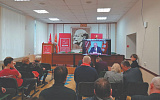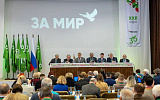Russia faces two huge challenges. The first is its $160 billion-plus mountain of foreign debt, most of which must be renegotiated.
That looks all but impossible, without a deal of sorts with the West-and that, in turn, will come only if Russia has started to put its financial house in order.
Prime Minister Vladimir Putin's second obstacle is therefore political. He must, among other things, push a realistic budget through parliament, and start reform of the banking system.
That is far easier said than done. It is precisely issues such as these which have tripped up every previous government. Russia's tycoons do not want their banks reformed. Parliament does not like to cut spending or to raise taxes. All too many civil servants live off what they can siphon from the state.
The unelected men who run Russia's state machinery and the old sweats from the days of Soviet central planning who control its regions are for the most part relics of the Soviet era, whose main aim is to hang on to their jobs-and huge state hand-outs.
Much of Russia's nascent middle-class has been pulverized. The monetised economy is barely half the size of the Netherlands'. Beggary, penury, crime, alcoholism, the horrible novelty of urban terrorism, and African levels of male life expectancy of 58 years all help to keep the anger bubbling-and contribute to the sense of near-despair that grips only too many Russians.
And an onslaught on the corruption and bad government that lie at the heart of Russia's ills remains a gigantic, and some fear hopeless, task.
But it is Chechnya, a tiny republic in the North Caucasus-which should have never been more than a footnote to Russian history-or a background to Leo Tolstoy's early novels-that is, yet again, the biggest of the country's immediate worries.
Still, Russia can hardly be blamed for wanting to punish those who planted the bombs that have killed about 300 civilians, most of them in Moscow. And even if Russia were run by enlightened and honest reformers, the Caucasus would be a worry.
It is plain that fundamentalist Muslims, including some Chechens, wish to make mayhem along Russia's southern rim with a view to creating some kind of extreme Islamist regime there. Though there is no reason yet to believe the present Chechen government was directly responsible for the bombs-they have certainly done it no good-various Chechen zealots are indeed suspect.
Nor can Russians really be expected to welcome any further dissolution of what was once a huge empire: in less than a decade, half of Europe has gone, along with a vast slab of Asia. And now, along the southern edge of Russia itself, an array of midget nations seems to be making a fool of the old imperial power-and killing Russian civilians to boot.
And it can do no good for the United States or NATO to see Russia once again humiliated. That result can only aggravate Russia's darker nationalist currents and distract it from more progressive tasks. The West has-or, at least, should have-a larger interest in a Russia that does better than slide miserably down the ladder of politicized corruption towards anarchy, even-as disaster piles on disaster-disintegration, all the while bristling with nuclear weapons.
Turning the screw on Grozny
The Kremlin's mood is bleakly determined. No settlement has followed the truce that ended the disastrous 1994-96 war in Chechnya. Most of the blame lies with hard-line Chechen Islamists, who have prevented Mr. Maskhadov from reaching any political accommodation with Moscow. Crime flourishes amid the bombed-out ruins of Grozny, where kidnapping is the only profitable industry.
In contrast to 1994, there is general support now in Russia for military action. The Kremlin and the army appear to have learnt from the costly blunders of that Chechen war. Raw conscripts are not being sent blindly into battle. Russia is copying NATO tactics in Kosovo, bombing strategic targets to ratchet up the political pressure and avoiding population centers. The military justifies its actions with briefings and video clips while diplomats attempt to blunt Western concern by underlining the Islamists' links to Osama bin Laden and calling for intelligence help in the war against terrorism.
Instead of a full-scale invasion, the army says it is trying to isolate the Chechen cauldron with a cordon sanitaire. It has occupied land north of the Terek river, advancing to a line that formed the natural boundary between the Russian Cossacks and Chechens in the last century and which runs through Chechnya from west to east about 25 miles north of Grozny, the capital.
Yet Mr. Putin has indicated that the goal of the advance into Chechnya is significantly more ambitious than simply creating a security zone around Chechen territory to prevent Islamic guerrillas from infiltrating neighboring Russian regions.
Now, Putin says, Russian troops are to press a full-scale campaign against the guerrillas. "Establishing a cordon sanitaire is just one stage in this operation," Putin said. "But the ultimate aim is to fully destroy terrorists and their bases throughout Chechen territory."
According to Mr. Putin, Russia intends to resettle tens of thousands of Chechens displaced by the conflict in parts of Chechnya controlled by federal troops-a clear indication that Moscow plans to split the separatist southern region in two.
The Russian plan would effectively create two Chechnyas, with Russian troops apparently occupying the north and leaving the rest of the territory under separatist Chechen control. In the meantime, gas supplies to Chechnya have been cut off, and Grozny is now without water, heat or electricity.
After Vladimir Putin threw his support behind an exile group who declared they were establishing a new Chechen government loyal to Russia, military analysts have speculated that Moscow is now bent on conquest of Chechnya followed by the installation of a puppet regime.
The exile group has been formed by the 48 surviving members of a Chechen parliament elected in June 1996, towards the end of Russia's unsuccessful two-year war against rebels in the breakaway republic.
They have been living in Moscow since a peace agreement was signed in August 1996 that led to the withdrawal of Russian troops and Chechnya gaining de facto independence from Russian control.
"According to Russian law, this is the most legitimate body," Mr. Putin said. "We will give them full support."
Amin Asmayev, one of the Moscow loyalists, announced after meeting the prime minister that the new government would "uphold the Russian constitution and Russian laws."
Grim choices
Yet, despite initial successes, critics say, the same ingredients for disaster as in 1996 are there. The one flaw in all this is that Mr. Basayev and the Wahhabis staged their uprising in Dagestan to force just such a confrontation with Moscow. They see this as the only way of uniting Chechens in a jihad against Russia and setting up an Islamic republic across the whole of the Caucasus.
They could have miscalculated. Their cause is not popular: a Chechen mission to Dagestan had to be called off after Dagestanis blocked the road in protest at the Chechen incursions. But even Mr. Maskhadov turned to the Islamic warlords after Russian troops crossed the border and called for a "holy war" against Moscow.
The second flaw is that Moscow is racing against time. Most military analysts agree that Mr. Putin had only one month to decide on his strategy. If he makes up his mind to storm Grozny, casualty rate may be higher than the Russian public would be willing to accept.
And if Mr. Putin decides to stay at stage two and maintain the security cordon throughout the winter, he will have to keep thousands of troops on operational status for months in the worst possible conditions. In four weeks the weather will change, bringing mist and fog to add to the confusion and vulnerability of the Russian soldiers.
They will face a prospect of a bleak winter: defending a cordon sanitaire that the enemy will penetrate with growing efficiency and vigor. The temptation will always be to call in the air force and start bombing. Then the quagmire the Russian government says it wants to avoid may be all set.

















